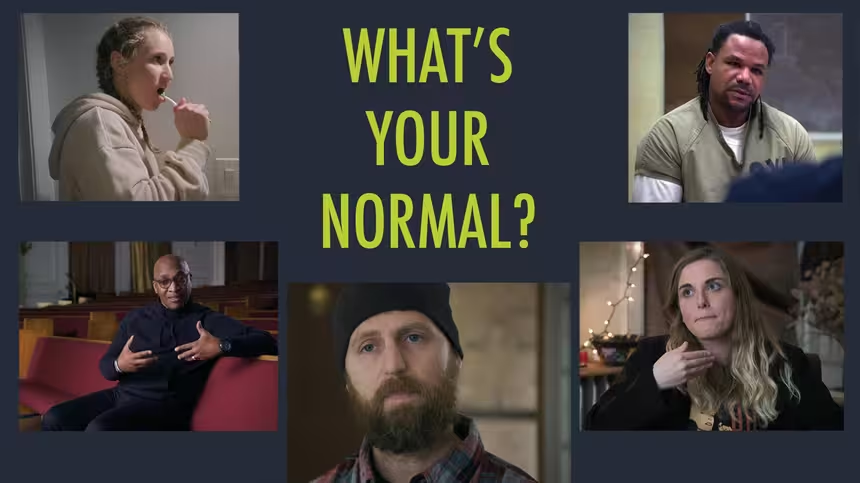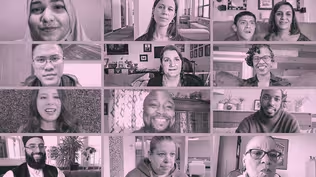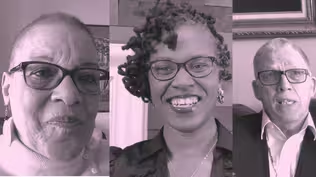
Dr. Hooman Keshavarzi | Decolonizing Mental Health
Special | 4m 3sVideo has Closed Captions
Dr. Keshavarzi is building psychological treatment processes around faith-based concepts.
Muslims don’t often seek mental healthcare because of the dearth of services that integrate faith-based concepts into treatment practices. Instead, they seek help from family members, clergymen - people who don’t have the formal training to provide them with adequate care. Dr Hooman Keshavarzi’s Khalil Center provides that much-needed oasis that is a confluence of psychiatry and the Islamic faith.
Problems playing video? | Closed Captioning Feedback
Problems playing video? | Closed Captioning Feedback
Funding for Mysteries of Mental Illness is provided by the Corporation for Public Broadcasting, Johnson & Johnson, the American Psychiatric Association Foundation, and Draper, and through the support of PBS...

Dr. Hooman Keshavarzi | Decolonizing Mental Health
Special | 4m 3sVideo has Closed Captions
Muslims don’t often seek mental healthcare because of the dearth of services that integrate faith-based concepts into treatment practices. Instead, they seek help from family members, clergymen - people who don’t have the formal training to provide them with adequate care. Dr Hooman Keshavarzi’s Khalil Center provides that much-needed oasis that is a confluence of psychiatry and the Islamic faith.
Problems playing video? | Closed Captioning Feedback
How to Watch Mysteries of Mental Illness
Mysteries of Mental Illness is available to stream on pbs.org and the free PBS App, available on iPhone, Apple TV, Android TV, Android smartphones, Amazon Fire TV, Amazon Fire Tablet, Roku, Samsung Smart TV, and Vizio.

Join the Campaign
Share your story of dealing with mental illness through textual commentary, a still image, a short-form video — however you feel most comfortable — using the hashtag #MentalHealthPBS on social media.(slow bright music) - I'm Hooman Keshavarzi, I'm the executive director of the Khalil Center.
I'm a clinical psychologist and the founder of the organization.
I was born in Turkey, Azerbaijani ethically, but migrated with my family as a child to Canada, Toronto, Canada is where I grew up.
That's where I got married, had my first child.
I was doing specialization actually in psychology at the undergraduate level at the University of Toronto.
And then we moved to the US to Chicago to do graduate education.
Being a Muslim, having my own kind of a spiritual awakening, I started to become a lot more active.
And I found that I was making meaning of my own identity and self through the lens of my own spirituality and my faith, my religious background.
I felt that when I was in my undergraduate education, that there was something missing.
What was missing was that there wasn't people that look like me, people from my history, from my tradition being represented.
That took me on this quest to really learn more and to develop myself and to kind of explore these two worlds and started to really engage in this research as well as setting up an institute that would really put that into practice.
Making meaning of our environments is a very human process.
We are meaning making creatures by our, by our very design.
I felt that removing the topic of spirituality and culture with personal histories of individuals really divorces them from that huge meaning making structure and skill and tool that they have.
The vast majority of people in America, research shows, cope with struggle through their faith-based backgrounds, their spirituality.
The human being is whole, right?
And since the human being is whole, we can't divorce these aspects out of them, right?
And so for me as a Muslim, I couldn't relate to mainstream behavioral health care.
We find that for many Muslims, they are underrepresented in mental health care settings.
They're more likely to go to clergy, even though clergy doesn't have a formal psychological training.
They're more likely to go to them instead of going to mental health providers.
I mean, our research shows what the barriers are, language, culture, religion.
What are Muslims looking for in a therapist?
There is data or studies to show that Muslims are looking for not only a professional, in fact, they love a professional.
But they're also looking for somebody who can effectively integrate their faith based concepts and mechanisms and ideologies and beliefs into the mental health encounter.
Not that they're just the Muslim by the way, but somebody who's actually willing to kind of embrace that part of themselves and embrace that part of the client and to facilitate that journey.
(slow dramatic music) - I first had a manic episode at the end of my first marriage, and that was actually the cause of my first divorce.
So when it happened to me, when I had an episode, people distanced themselves from me because I didn't understand what was happening and they also didn't understand what was happening either.
(slow dramatic music)

- Science and Nature

Explore scientific discoveries on television's most acclaimed science documentary series.

- Science and Nature

Capturing the splendor of the natural world, from the African plains to the Antarctic ice.












Support for PBS provided by:
Funding for Mysteries of Mental Illness is provided by the Corporation for Public Broadcasting, Johnson & Johnson, the American Psychiatric Association Foundation, and Draper, and through the support of PBS...

